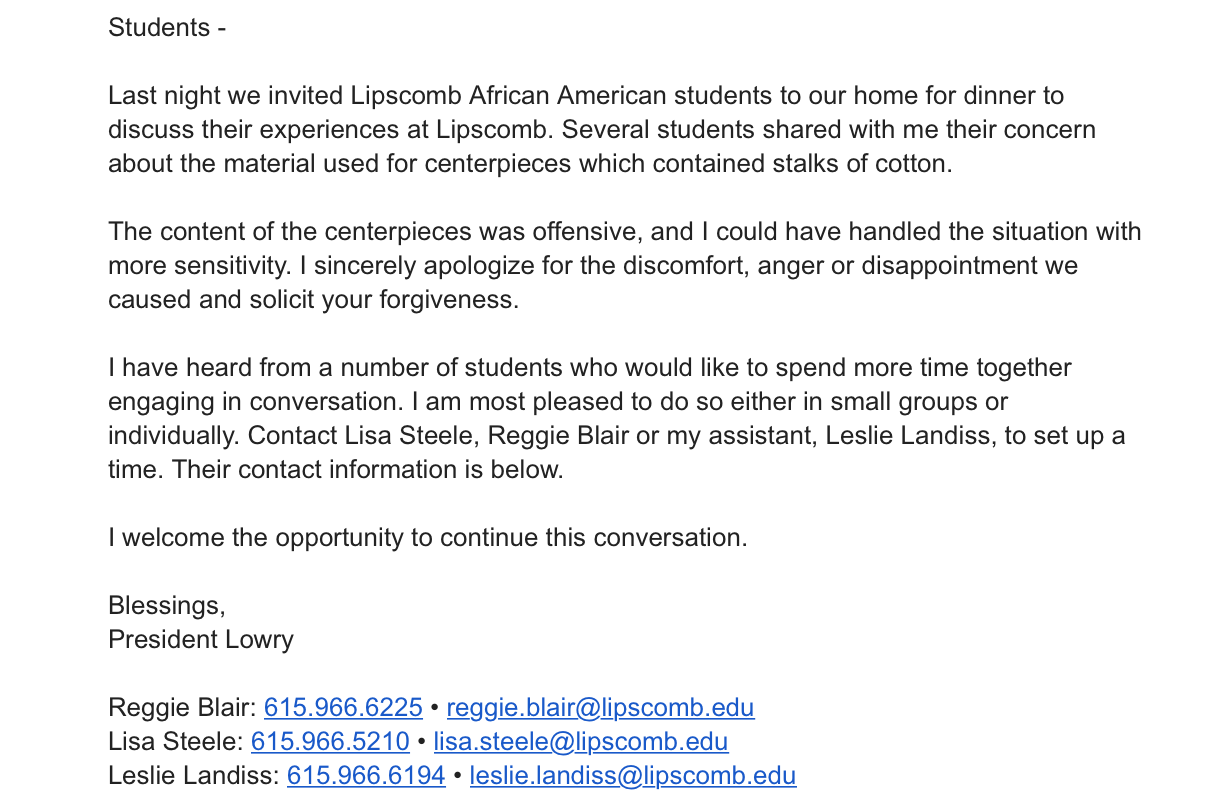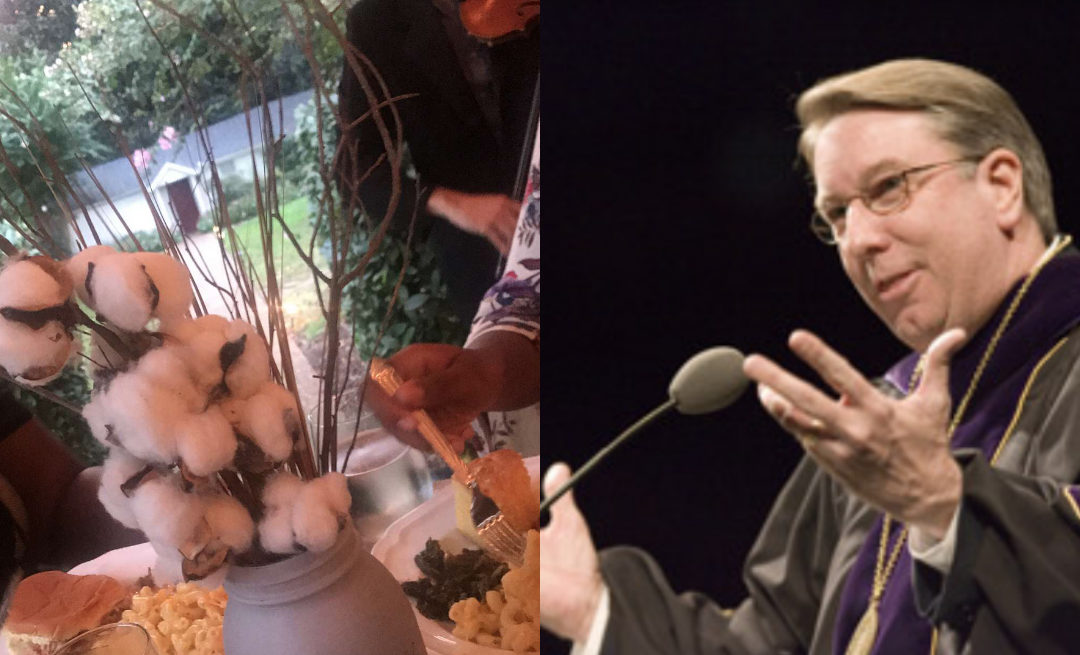The incident concerning cotton stalk decorations during a dinner for African American students at President Randy Lowry’s home occurred one month ago.
The infamous dinner made national news, not only for the display of cotton stalks during the dinner, but also for the cornbread and collard greens meal that was served at President’s Lowry’s table and the live banjo and Stevie Wonder music played.
On September 15, the day after the dinner, President Lowry wrote an apology.
Race relations have been the subject of campus-wide discussion and activities; the following Monday, the on-campus Media Masters event hosted by Robert A. Jackson, Jr. discussed race communication and bias.
Also, the appointment of Keandra Golden as an interim African American students coordinator was announced during “The Gathering” chapel.
The week of the dinner and apology, the African American students coordinator position was vacant. Lowry noted that Golden was “gracious” to step up and help where she was needed, even though this isn’t what she originally came to Lipscomb to do.
In an exclusive interview with Lumination, President Lowry noted he believes that oftentimes one grows the most after going through a difficult time. This analogy, he believes, is indicative of how the university has taken steps to reflect and rebuild since.
“Hopefully, we’ll look back six months from now and say, ‘Some of that growth would not have happened, had we not a difficult moment,'” Lowry said. “For some of our sister schools in Florida, they’ve grown because of a hurricane. They didn’t ask for it, and they wouldn’t want it to happen again, but they’ve grown because of it, and it never would have happened had they not had to face that challenge.
“The reality is even people who work really hard at what they do don’t do it perfectly,” he continued. “Even the Bible talks about it — ‘All of us fall short of the glory of God.’ Even the President of your university falls short of the glory of God, and I’ll make mistakes. But I think the faith that we have suggests that when you make a mistake, you do two things: one, you’re responsible and accountable and apologize. Apologies are meaningful when following them with actions that reflect what your values are. But then the other piece of it is forgiveness and grace.”
He also added that, even though he does take responsibility for the incident, he isn’t sure how many people have thought it through that he was not actually the one who “put the table decorations together,” ordered the food and arranged the music.
“I walked in, and that [the decoration] was set up in the place we were having dinner,” Lowry said. “But I’m responsible for it, and I will be.
“It’s interesting to me, reflecting on the social media that I’ve been exposed to the past two weeks . . . I don’t see any forgiveness or grace out there, and I think that’s very sad because reconciliation will not happen unless all of those things happen — the offense, the apology, the response, the commitment to do things differently and the forgiveness and grace.”
The issue was first publicly brought to light through an Instagram post by @nakaylayvonne, which shows a photo of the cotton centerpieces.
The student also posted a video showing two of the students present speaking with President Lowry while banjo music is playing in the background.
“I can’t recall it word for word; we did have some dialogue at the table,” Lowry said. “I was trying to meet all the students . . . I thought I could acknowledge their concern, and we could move on. Obviously the concern was deeper than that. I didn’t leave that evening thinking there was a serious problem.”
Lowry said he understands why the students were offended — because of the decorations, which relates to the history of African Americans and slavery in this country. He also noted that he has heard many different opinions surrounding the issue — some agreeing with the students’ position and others disagreeing.
“Not everyone agrees . . . I’ve heard from a variety of people the last two weeks — but it doesn’t matter that other people aren’t [offended]; it matters that they were, and it matters that their president, when we learned about that, went to take the appropriate steps,” he said.
Lowry said he does not want to criticize the students because he said he believes they did what they thought was the right thing to do in the moment by posting on social media. However, he did add that, more broadly, he wants Lipscomb to be a Matthew 18 community.
“What I mean by that is the passage of Scripture where Jesus says, you know if you have conflict, here is how you might want to deal with it: you might want to go to the person you have conflict with first,” Lowry said. “I think the wisdom of that is it keeps it between the two people that were involved in the dispute.
“And if that doesn’t work, then bring somebody else along with you, and if that doesn’t work, then bring somebody else along who has the power in your community. I think there’s great wisdom in being Biblical and understanding what Jesus was calling us to do, and I hope that we do that in our community.”
 After the student’s Instagram post, Lipscomb sent out President Lowry’s apology email to the entire student body and faculty and also posted it on the university’s Instagram, Twitter and Facebook accounts.
After the student’s Instagram post, Lipscomb sent out President Lowry’s apology email to the entire student body and faculty and also posted it on the university’s Instagram, Twitter and Facebook accounts.
Lowry said he wants the university to keep moving forward, in accordance with the goal that the Board of Trustees “decided more than a decade ago” when they sought “to create a very diverse campus.”
“When you decide to do that, you really are on a path to doing something somewhat unusual . . . as we’re trying to learn how to do this, you’re going to have some moments that are great, some moments of reconciliation,” Lowry said. “You’re also going to have moments where we miss, and you’re going to have to pick up from those moments and get back on track.
“If you look at this university over the past decade — when I came we had about 4% minority students, and now we have 22 or 23%,” he added.
Despite the cultural crisis with many students offended by the insensitive decorations, Lowry said his desire to create a diverse campus does not waver and neither does his hospitable philosophy.
“I will still invite African American students over for dinner,” Lowry said. “I will still invite international students over for dinner. I will continue to make my home a hospitable place for students . . . I wouldn’t change that.
“We’ll be more cautious about any sensitivities we can understand, but we’re going to stay on the same track we have been on, trying to be hospitable and trying to create a community, where when you leave, you leave, I hope, cross-culturally competent.”

